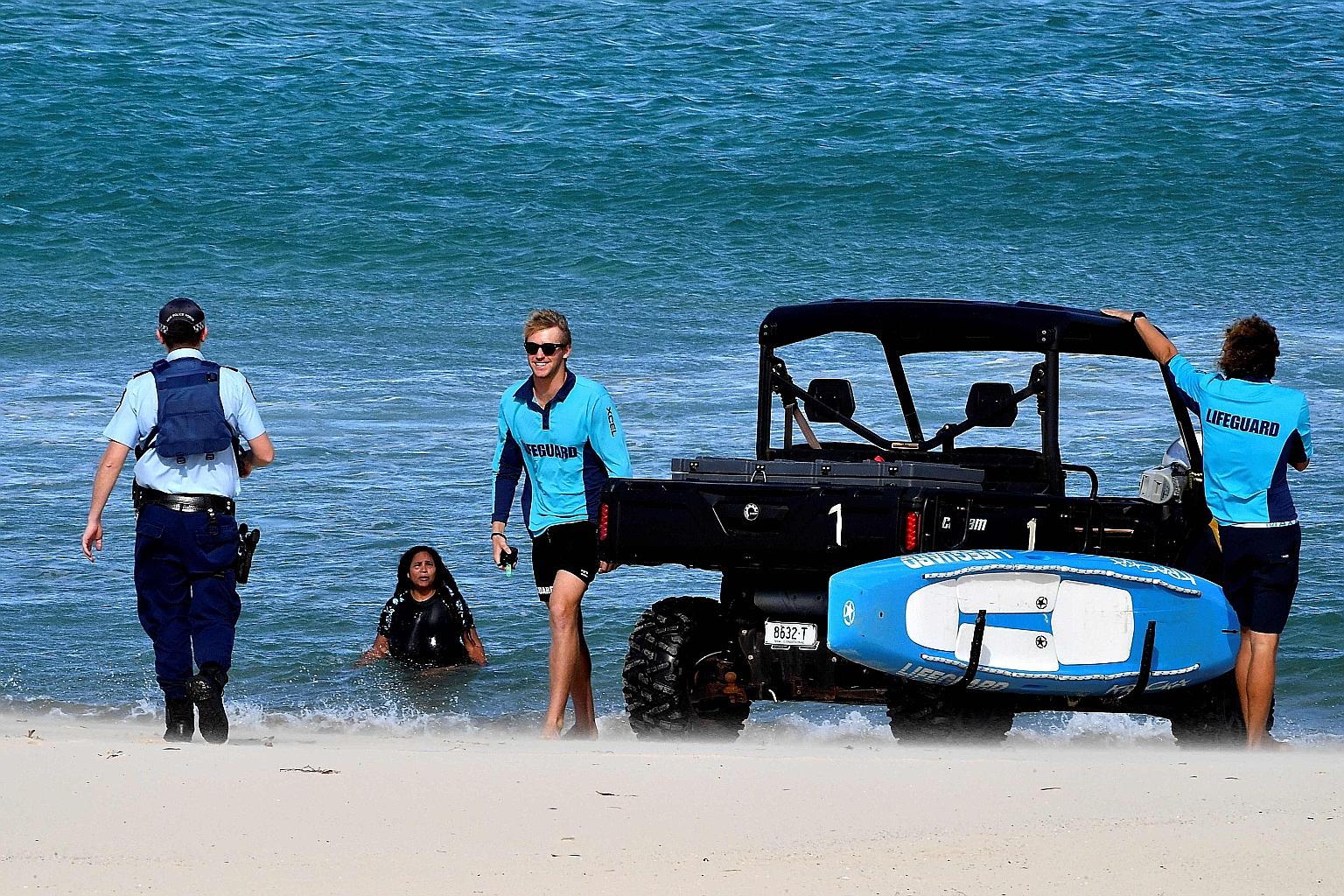Coronavirus: Are police overzealous in enforcing social distancing?
Fear that community support for rules will wane after officers issue controversial fines
Sign up now: Get insights on Asia's fast-moving developments

A police officer telling a woman to get out of the water at Sydney's Bondi Beach yesterday. The beach has been closed as part of measures to rein in the spread of the coronavirus. Social distancing rules vary across Australia's states and have caused confusion about what activities are allowed.
PHOTO: AGENCE FRANCE-PRESSE
Jonathan Pearlman For The Sunday Times In Sydney, Jonathan Pearlman
Follow topic:
Australian police have come under criticism for being too heavy-handed in enforcing social distancing rules after officers targeted mothers with babies and individuals sitting alone in parks.
Despite the rules being quickly and readily accepted by most Australians, there are concerns that the overzealous approach by some officers risk jeopardising community support for the measures.
States such as New South Wales (NSW) and Victoria have introduced fines of up to A$20,000 (S$18,000) for breaching the new distancing rules.
In NSW, the country's most populous state and the worst-hit by the coronavirus, people are required to stay home except for specific activities such as essential travel, buying food, donating blood and exercise. Penalties include fines of up to A$11,000 or six months in jail.
Social gatherings across the country have been limited to two people, except weddings and funerals which can include five and 10 people, respectively.
Victorian police have been particularly strict and have issued about 850 fines compared with about 300 in NSW.
In a case that made national headlines, a 17-year-old learner driver in Melbourne was fined A$1,652 after she was pulled over during a driving lesson last week with her mother.
Ms Sheree Reynolds, the driver's mother, said she understood the need for rules, but told ABC News: "I think common sense is lacking.
"We hadn't gotten out of the car, we weren't planning on getting out, we were just doing a loop around and coming home."
Police eventually withdrew the fine but warned that driving lessons were not essential and remained unlawful.
In another incident, footage showed a series of police cars with sirens flashing driving onto the grass at a quiet waterside park in Sydney and dispersing people walking with prams or sun-bathing alone, even though they were keeping a safe distance from others.
NSW Police Commissioner Michael Fuller later acknowledged that his officers could have been less confrontational.
"I've seen the video myself," he told reporters. "Could they have got out of the car and achieved the same thing in a less aggressive way? Yes, they could. On the other hand, there's (hundreds) of parks we've got to get to."
Australia had more than 6,200 confirmed cases of Covid-19 and 56 deaths as of yesterday. But social distancing measures, along with travel bans and enforced isolation of international arrivals, have been credited with drastically lowering the infection rate. The daily increase in number of cases peaked on March 28, with 460 new infections, but has steadily declined to 106 as of Friday.
Prime Minister Scott Morrison said last Thursday that Australia had slowed the spread of the virus, adding: "It's clear that social distancing measures are working.
"But there is a long way to go, we will be living with this virus for at least six months."
The social distancing rules vary across states and have caused widespread confusion about what activities are allowed. In NSW, common queries have included whether people are allowed to go cycling (yes, but not in groups), boating (yes, though it is not recommended) and play golf (yes, in pairs only, and some clubs now bar players from removing the flag from holes).
But some commentators believe the social distancing rules are too vague and give police excessive powers to decide what sort of behaviour is acceptable.
Ms Pauline Wright, the president of the Law Council of Australia, has urged police to "be reasonable" to ensure that the measures retained community support.
The NSW Council for Civil Liberties also called on police to be more restrained.
"There is widespread community observance of the laws," said a spokesman for the council, Mr Stephen Blanks.
"If the police are seen to be enforcing them in a heavy-handed way, it will result in a loss of community support," he added.
But most of the fines appear to have been for blatant breaches of the rules. These included a party in Victoria at which all 20 guests were fined A$1,652 each and instances of groups of friends travelling together in cars or playing video games together.
Still, state leaders and police have indicated they will try to ensure the rules are applied flexibly.
Mr Fuller promised police would take a "sensible approach".
"I get it, and we want people to be able to stay fit and physically and psychologically healthy," he said.

